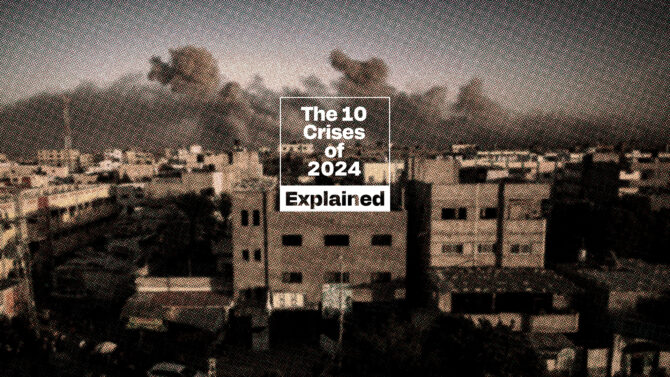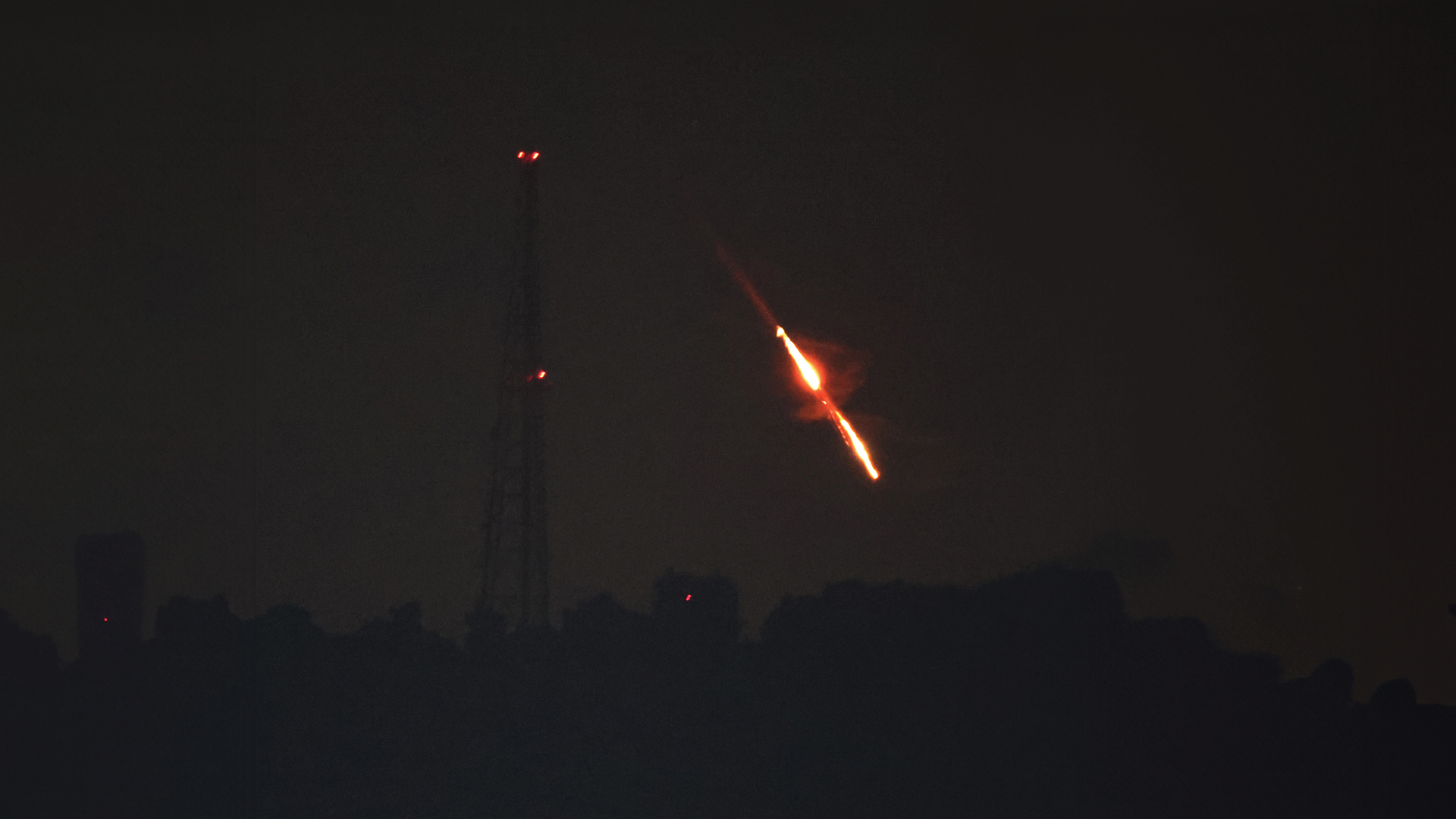Iran’s “True Promise” and the next day. Dr. Hans-Jakob Schindler, a seasoned diplomat with extensive experience in the Middle East and a former coordinator at the UN Security Council, shares insights with iMEdD.
On Saturday night (13/4), Iran initiated an aerial attack employing over 300 drones and missiles targeting Israel. This strike was prompted by the bombing of the Iranian embassy in Damascus earlier in April, which resulted in the deaths of seven senior Tehran military officials and six others, an incident Iran attributed to Israel. Notably, this marked Iran’s first-ever direct attack on Israeli soil. The Middle East is on the verge of a potential widespread conflict, with global attention at its peak. What comes next?
2. Israel-Iran: Is War Spreading Across the Middle East?

The 10 crises of 2024 – Explained: 2. Israel-Iran: Is War Spreading Across the Middle East?
Dubbed “Operation True Promise”, the Iranian strike lasted approximately five hours, laying bare the “shadow war” simmering between Iran and Israel. Concurrently, amid the Gaza conflict’s onset, armed groups and militias purportedly supported by Iran—such as Hezbollah in Lebanon, the Houthis in Yemen, and Shiite factions in Syria and Iraq—have struck Israeli and US targets across the region.
On April 12th, the International Crisis Group issued a warning, cautioning that the assault on the Iranian embassy in Damascus had the potential to ignite an open and all-out regional conflict between Iran and Israel, spiraling into a catastrophic regional war. The analysis also underscored that “an attack by Iranian forces on Israel, especially a direct one, is likely to invite an escalatory response in the form of Israeli reprisal.”
“Until today it was clear that mutual attacks would be indirect, i.e. either attacks by Israel outside Iran or attacks by Iran only through proxies. With this unnecessary Iranian escalation, the above equilibrium has been lost and it is not clear what the new equilibrium will be,” said Dr. Schindler’s in his initial comment during a Zoom call from the US, where he has been living permanently for the past few years.
Going forward, Israel will have to expect potential Iranian attacks on its territory any time it attacks Iranian proxies
Dr. Hans – Jakob Schindler
Dr Schindler served as Germany’s diplomatic representative in Iran from 2005 to 2011 and currently is the Senior Director of the Counter Extremism Project in New York and Berlin. Speaking to iMEdD, he highlights that the recent strike by Tehran, which occurred just the day before yesterday, disrupts the status quo between the two nations and he further explains that despite successfully intercepting the assault, Israel has suffered a significant loss of crucial strategic capability. “Going forward, Israel will have to expect potential Iranian attacks on its territory any time it attacks Iranian proxies or any significant Iranian military or intelligence personnel in the region. This means, at this moment, Israel has lost an important deterrent capability against Iran. Clearly Iran is no longer sufficiently deterred by Israel not to attack directly, ” asserts Dr. Schindler.
A publicly announced attack
More than 120 ballistic missiles, 170 drones, and 30 cruise missiles were fired in Saturday’s attack, estimated to be the largest drone attack ever carried out in the world and the largest missile attack ever launched by Iran. The operation included Iranian Shahed 136 and 238 drones, commonly known as kamikaze drones, which are also reportedly used by Russia against various targets in the war in Ukraine.
According to Israeli military sources, 99% of the missiles were intercepted before reaching their targets, with contributions from US, UK, French, and Jordanian forces. However, as Dr. Schindler explains, Iran’s aim may not have been outright military success. “Of course, it seems that Iran has done quite a few things to ensure that the damage of its attack against Israel was minimized. It spoke publicly about attack Israel for several days, at the time of the attack, immediately after launching the drones and missiles, Iranian state TV announced the launch, giving Israel, the US, and regional states hours in the case of drones and quite a long time in the case of the missiles to prepare their defense.”
It seems that Iran has done quite a few things to ensure that the damage of its attack against Israel was minimized
Dr. Hans – Jakob Schindler
The only successful outcome, as per the Israeli sources, was some material damage to a military base in southern Israel, which did not affect its functionality. However, Dr. Schindler highlights that the failure of a significant strike may not eliminate the possibility of ongoing tension: “The lack of damage from the attack will be taken by some in Israel and the West as a sign that a potential attack on Iran is not going to be very costly in military terms, which of course, makes it more likely that a direct attack will occur eventually. “
The next day
For Tehran, the matter can be deemed concluded, according to a post on social media by Iran’s mission to the United Nations. Israel’s response remains uncertain, though official sources have indicated that “it will respond when the time is right.” In contrast, Iranian leadership has warned of intensified attacks if Israel retaliates, including potential targeting of US military bases should they support Israel’s actions. However, the US has made it clear that it will not participate in direct retaliation against Iran alongside Israel.
The lack of damage from the attack will be taken by some in Israel and the West as a sign that a potential attack on Iran is not going to be very costly in military terms
Dr. Hans – Jakob Schindler
The developments of the last few days are expected to affect the rest of the Middle Eastern states, their relations with each other, and their competition for hegemony in the Muslim world in many ways, Dr. Schindler notes, speaking to iMEdD. “The fact that both Jordan and Saudi Arabia shot some of the Iranian material out of the sky last night demonstrates once more where the fault lines in the region are. Of course, both Jordan as well as Saudi Arabia say that they only defended their skies, but their actions nevertheless clearly helped Israel,” he notes.
The trajectory of the ensuing days heavily depends on Israel’s choices. “Israel’s decisions will determine whether the situation stabilizes, escalates, or rapidly deteriorates into a regional conflict,” Dr. Schindler concludes.
